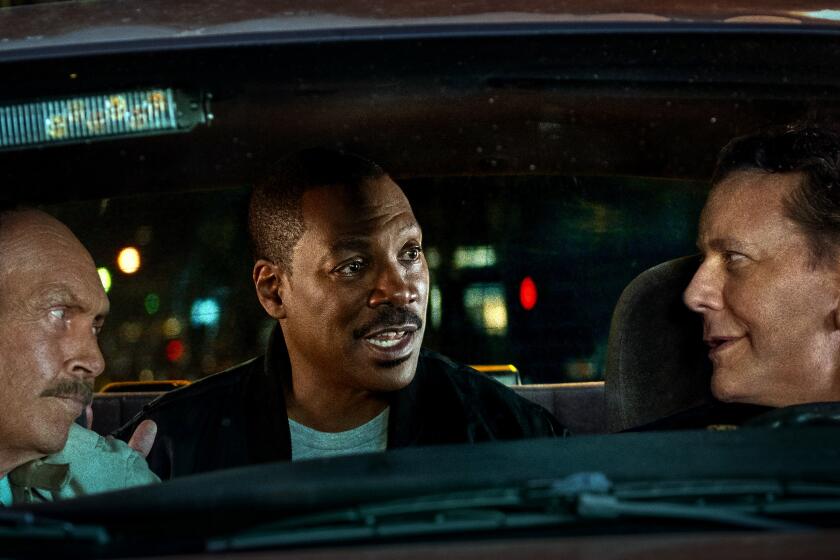Review: The playfully imaginative anime ‘Mirai’ tells a family story that’s not just for kids
Master Japanese animator Mamoru Hosoda makes family films, but not in the way you think.
It’s not that his films are suitable for all ages, though they mostly are. And it’s not even that the family unit is central to his work, though it is.
Rather it’s that Hosoda’s films stretch the boundaries of both style and content within the family film rubric. Disney movies these most definitely are not.
Hosoda’s compelling “Wolf Children,” for instance, shows in a very naturalistic way what happens when a young woman falls in love with a college classmate who turns out to be part wolf. Not metaphorically but literally.
And now we have “Mirai,” in which the seemingly quotidian theme of a toddler having to get used to the addition of a baby sister to his life is treated in a fantastical way that never goes where you expect.
An only child himself, Hosoda explained in the novelization of “Mirai” that this phenomenon was a surprise to him when it emerged.
“I was inspired by my own children, especially the reaction of my oldest boy when his new baby sister arrived,” he wrote. “It was both adorable and fascinating the way he cried, as if she were stealing our love, and I wanted to turn it into a movie.”
Though it focuses on that intimate family unit, “Mirai” opens with an expansive, bird’s-eye view of the port city of Yokohama as the camera ends up hovering on a small house with an enclosed courtyard that will be central to all the action.
Four-year-old Kun (Jaden Waldman in this English-language dubbed version) is introduced in the house waiting excitedly with his grandmother for his parents to return from the hospital with his new sister.
The notion that even everyday events can seem magical is central to Hosoda’s animation. The director is especially good at creating the antic nature of Kun’s nonstop life, like his pleasure at being able to fog windows with his breath and then rub the moisture away.
The first words he hears his returning father, voiced by John Cho, say (“Into your castle, my little princess”) are not encouraging, but Kun soldiers on.
He’s initially full of enthusiasm for his sister (“Let me see, I want to see it!”) and pays close attention when his mother, voiced by Rebecca Hall, tells him “you must always be nice to her no matter what.”
But Kun is just too young to understand why his parents aren’t as interested in him as they used to be, too young to see, as the film shows us, that they are dealing with stresses of their own — his architect dad transitions to househusband, while his mom goes out to work every day.
Also, his desire to be a good big brother to Mirai (her name means “future”) exists with a kind of malevolent curiosity that leads him to push and pull at her tiny face until she howls in protest.
One of the things “Mirai” is especially good at is depicting the quicksilver nature of Kun’s personality at this young age, how his mood can go from happy and cooperative to complete howling rage in a Yokohama minute.
But just as we are getting comfortable with “Mirai’s” day-to-day world, the film takes a daring jump into another universe entirely as Kun wrestles with reconciling himself to his new family situation.
Without any preamble, Kun’s courtyard refuge turns into a kind of magic zone where no-limits fantasy and recognizable reality unapologetically intertwine in a way that is quintessentially Hosoda.
First, Kun encounters Yukko, the family dog, but transformed into a rakishly handsome human (Crispin Freeman) who looks like he stepped right out of a romance novel – except for the tail.
Then, at different points in the narrative, Kun has a series of unexpected family-related encounters as the film explores “the little things that come together to make us who we are.”
Among others, Kun encounters his great-grandfather as a motorcycle-riding young rebel, his own mother as a youthful hellion, and, most perplexing of all, his own sister Mirai as an engaging “Mirai from the future” teenager.
Some of the situations Kun experiences, like a nightmarish encounter in Tokyo’s enormous central train station, run the risk of being too frightening for youngish audiences, but Hosoda doesn’t have to worry about focus groups tampering with his vision. His films are his own, and we are fortunate to have them.
----------
‘Mirai’
Rating: PG, for thematic elements including some scary images
Running time: 1 hour, 40 minutes
Playing: Laemmle’s Glendale, Glendale; Frida, Santa Ana; Regency Paseo, Camarillo
More to Read
Only good movies
Get the Indie Focus newsletter, Mark Olsen's weekly guide to the world of cinema.
You may occasionally receive promotional content from the Los Angeles Times.
![LOS ANGELES, CA - JUNE 17: [Cody Ma and Misha Sesar share a few dishes from their Persian Restaurant Azizam] on Monday, June 17, 2024 in Los Angeles, CA. (Ethan Benavidez / For The Times)](https://ca-times.brightspotcdn.com/dims4/default/7ffc7f6/2147483647/strip/true/crop/5110x3417+306+0/resize/320x214!/quality/75/?url=https%3A%2F%2Fcalifornia-times-brightspot.s3.amazonaws.com%2F79%2Fdc%2F4d29255545f5b9813315901692bc%2F1459972-fo-azizam-review20-eba.JPG)





